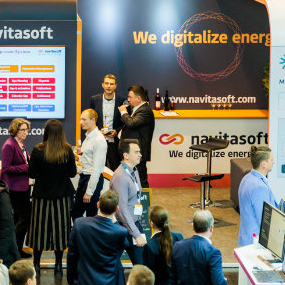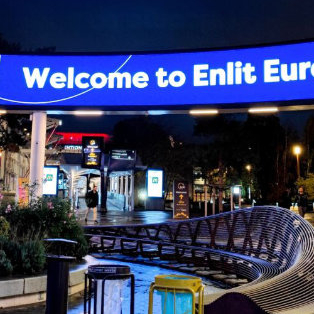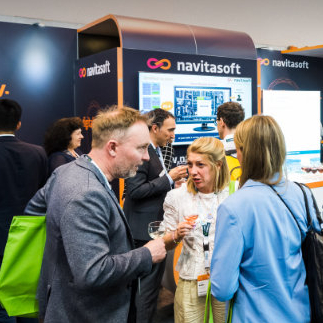
Article translated from the original Hungarian by Emese Fekete in Forbes Hungary.
Ákos Füzi is not only known for his billion-forint energy software company, but also for his management expertise. And although he didn't ask for it, life taught him a hard lesson on how to let his team become self-sufficient.
He is lying in the snow, motionless. The last thing he remembers is the decision he had to make: go onto the jump or swerve past it. He chose the former; the previous jump had gone so well. This one didn't. A backflip, but he landed on the back of the head. Head clear, body lifeless. He's now surrounded by people, one of them his son, a medical student. They maintain eye contact. There is fear in their eyes. The rescuers arrive. They decide not to use the stretcher and call a helicopter instead.
The pain comes in waves. It's as if he has suffered a gunshot wound to his left leg. In his mind’s eye, he actually sees a black bullet entering and making its way up to exit through the top of his head, but it eventually gets absorbed somewhere in his body. Silence, then another gunshot. Three or five jolts, almost unbearable pain.
The helicopter arrives. It approaches him three times, hovering around, before the bed is finally lowered. They stabilize his body, talking to him all the while. "Name?" "Ákos Füzi." "Born?" "June 15, 1970. Then he asks, "Can I have a glass of water?" "No."
The spine specialists at the University Hospital in Ljubljana are among the best in the world. His sixth cervical vertebra is damaged, a large piece of bone has broken off in the spinal cord, and the connection between the brain control center and the rest of his body has been severed, hence the paralysis. They operate on him at once, removing a bone from his hip to replace the broken part of the cervical vertebra. They make no promises.
***
Less than a year after that skiing accident in Slovenia, the venue is Navitasoft's headquarters in Budapest’s eighth district. The 1.4 billion-forint energy software company, which sells 60-80% of its products abroad, is located in a highly gentrified area of the Hungarian capital. Its natural stone and white walls, raw wood furniture and functional, clean spaces paint a picture of a business that values brainpower. Ákos Füzi enters the boss's office with a brisk stride, no wheelchair, no pronounced limp; he only motions to his left hand, as if to show that it is not quite ready yet to make subtle movements. He feels at home, having founded the now sixty-strong company fifteen years ago. The one in February 2022 was their twelfth team-building ski trip.
"And the second time of letting go," he says of the six-month enforced hiatus following the accident, and then we go way back in time. With a prize-winning TDK [Hungary’s largest scientific event for students that has a special status in higher education talent management] thesis, the electrical engineering graduate from the Budapest University of Technology and Economics ended up in the pharmaceutical industry, and immediately got a glimpse into the workshop secrets of one of Hungary's legendary top managers. Since then, he has also developed an academic interest in various management theories, but at the time he was only fascinated by how Erik Bogsch was transforming Richter from a dusty, old socialist company into a hypermodern Hungarian multinational.
Ákos was working on electromechanical measuring equipment for animal experiments, and as an employee representative he was elected to the corporation's supervisory board. In the early 2000s he was entrusted with the management and commercial development of the Japanese subsidiary of Medimpex, which represented the domestic pharmaceutical companies - Richter as well as Egis and Chinoin, the latter of which later became Sanofi. Japan, its culture and especially its corporate culture have shaped his approach ever since, both to the pharmaceutical industry and the energy sector.
After returning from Japan, he made his first foray into energy when he joined Synergon, an established company, which later went bankrupt. At that time, in 2005, Synergon was a listed company with a turnover of 10-20 billion forints - Ákos was responsible for business development in the industrial utilities sector. And he became more and more aware of how exciting the energy industry was. "It has massive potential, there’s a huge demand for it, there’s money in it because consumption keeps growing. It’s a profitable industry, but there’s no fierce competition since most of the prices are negotiated," he says, describing the characteristics of the sector at the time, which a historic moment made even more attractive.
It was then that, not only in Hungary, the liberalization of the energy market began and the monopolies of the big energy multinationals were dismantled one by one. The sector was commercialized, many independent companies were given access to the giant pie, which is in fact an intricate system of complex networks with many energy sources (Russian, German, Norwegian and other suppliers), many consumers and a complicated regulatory background made even more complex by subtleties specific to each individual country. This is where free market mechanisms started to emerge, with the involvement of energy traders, gas storage companies and all stakeholders. Ákos realized that the secret to operation and success from here on was IT. “Software is the heart of it all,” he says, “it's what settles the accounts, aligns supply and demand and ultimately guarantees the security of energy supply.”
His big break is connected with this realization: in 2006 he managed to win the first major energy contract in the Hungarian gas market, which involved upgrading the central IT software for gas transmission. It was a one-off development, a lot of work and a major risk, but it was a success, and it emboldened him - clearly, energy was important enough to be treated as a priority industry. Synergon's owners didn't quite see it that way and didn't mobilize extra funding for it, but they agreed to let Ákos and 3-4 other "IP guys" (of the gas market IT platform developers) “spin off” and specialize in it, in addition to carrying out Synergon's other projects. Maintaining this momentum, they formed IP Systems, which would become Navitasoft years later when, with the Hungarian market opportunities narrowing, they started to work internationally under a name that sounded better abroad and, more importantly, was not taken.
"There were entrepreneurs among my great-grandfathers," Ákos says, explaining how far back you have to go to find the business gene in his family. One of them built up a tailor shop and a textile wholesale company, another ran a mill in Mukachevo, and a third was the first tenant and operator of the Gellért Hotel restaurant and café - when the family was still called Frenreisz - and, along with the Gundels, a key figure in the capital's hospitality industry. Many decades later, after the Hungarianization of the family name, following socialism and the regime change, Ákos Füzi was not adamant about owning his own company, but life had other ideas.
"He is a natural entrepreneur," says Dale A. Martin, former CEO of Siemens in Hungary. “He has been able to switch from pharmaceuticals to energy, build an internationally renowned software company and, in my view even more importantly, develop a school using his private funds. Instead of complaining, he invests his money and makes things better." Indeed, besides Navitasoft, Ákos now has several other interests, including a non-profit (see below), the idea of which emerged after he returned from yet another assignment abroad.
He had been running his company for five years, skipping one night of sleep per week due to the many assignments from Switzerland to our smaller region to the Baltics, when in 2013 he got another call from the pharmaceutical industry. This time they wanted him to go to Shanghai and set up Egis’ subsidiary there.
"It was a difficult decision to make, but in the end I said to my family that if they agreed to me going, I would tell Egis my conditions, and it would be clear that I was too expensive. But Egis still chose me. So I sat in a hotel, and I felt like crying because I knew that from then on I’d be ‘only’ the owner of my company. That was the first time I let go. The next time, after the accident, I didn’t have that emotional burden when the accident happened. Because I knew I’d already done it once."
***
In Japan, at the start of every workday, employees form a circle and each one answers three simple questions: What did you do yesterday? What are you going to do today? What do you need help with, i.e. what do you expect from the others? "Subway cleaners, police detectives, pharmaceutical workers… Everyone everywhere does these quick stand-up meetings. Because everything has a cycle and a day is the smallest unit," says Ákos.
What scares off many people - slow and collective decision-making; the primacy of the seniority principle; the connotations of a yes and the unsaid no that are alien to us - Ákos is entirely familiar with after spending four years in Japan (and another four years in China) and considers to be a great asset. He feels the same way about the basic tenets: that meaningful work is at the top of the value pyramid, that creation is a central social value, and that teamwork is much more important than individual responsibilities. It is always the team that receives the task, makes the commitment and is responsible for the work - ideally having a cross-functional composition, with all types of expertise. At a software company, this means designers, business analysts, senior and junior developers, testers; roughly six to eight people per team - something that in startup and IT circles is now usually called a scrum process, driven by scrum masters.
He tried to import what he had seen and learned in Japan. Through a consulting company he founded with a friend (Adaptive Consulting), he helps other firms incorporate the approach as requested, and there is no question that he runs Navitasoft the same way.
The daily stand-up meetings caused quite some confusion at first. In Budapest it was foreign and the colleagues were nervous; it took them a few months to get used to this type of meeting. But then, Ákos says, "I went on holiday, and when I came back, it was them that suggested we go back to stand-up because there was a disconnect and they didn't see that we were progressing."
When COVID struck, having the system in place was a great advantage. Because of the colleagues based abroad, Ákos already had experience with Zoom, and they also built in so-called sprints, which follow larger cycles. They now do sprints every two weeks, with each team member giving an update - preferably with everyone else having the chance to respond - and the team setting targets for the next two weeks.
He was clinging to something like that in the hospital bed. "My first thought was that I'd rather die. I had achieved everything in life, more than I’d ever wished for, and I didn't want to be a burden on my family. But it gives you tremendous strength that people love you and that your colleagues send word to let you know they accept you as a director, wheelchair or no. Nobody actually phrased it like that, but they made you feel that they don't care about your condition, they care about your opinion."
With this much support, he was also able to accept that he might never walk again. Just like the daily stand-up meetings, he too was always focused on the next little move. Meanwhile, his company had relocated to the office in the eighth district and they were wondering how to make it accessible, or whether to have an elevator. Ákos ordered a wheelchair. Yet by the time it was delivered, he was back on his feet.
***
Last February, everything came to a head. The skiing accident in Slovenia happened just days before the outbreak of the war in Ukraine, which in itself would have caused a problem for Navitasoft. Ukraine had been an important and sensitive market for them: they had made an unprofitable deal when developing an application for Ukrtransgaz for the domestic gas market, but they had also notched up a great success when delivering Ukrenergo, the central clearing system for electricity, for eight million dollars in World Bank funding - a system they have been operating ever since. However, one of their ongoing developments hadn’t yet been finished when the war started. As early as the beginning of the year Ákos considered it particularly risky that they had not been able to complete it.
The colleagues also felt the tension of the situation. Their boss was lying in intensive care, and they were in cahoots with his wife to prevent him from finding out about the Russian invasion, while busy working to secure a contract in a new market, Cyprus, which was about to be liberalized. They had won the tender before the ski trip but still had to finalize and sign it. Just to be on the safe side, Ákos had authorized two colleagues before the team-building event, and they sorted it out. By the time a nurse let it slip that there was a war going on in Ukraine, the Cyprus deal had been done.
"These were all touching and profound experiences that made me realize that the company is in good hands without me, and I couldn't do it any better myself," says Ákos. As it turned out, the Ukrainian market is not lost either: they have even gained a lot of new business by constantly moving servers when one of them is hit, and they've been able to support the country's power supply in this way.
There was another thing the accident could have thwarted, but it didn't. Even before the pandemic, they had started looking for foreign investors for a cloud-based project to develop a platform called Energy Market of Things (EMoT). It is based on the idea that, in liberalized and competitive markets, more and more small producers and consumers are becoming green and installing solar panels and wind turbines, for example. All of these players need software solutions. Before the pandemic, Navitasoft had promising negotiations in Poland to pre-finance the project, but the banks that were to provide the funding eventually pulled out, and so they had to find new opportunities. In the end, they accepted the offer of a Hungarian investor, the Blue Planet Capital Fund (Kék Bolygó Tőkealap), to raise HUF 1.2 billion in three rounds. (They have already raised the first two, worth HUF 800 million.) The paperwork had to be dealt with at the hospital, and the deal was announced in March last year.
If the name Blue Planet sounds familiar, it's basically because of János Áder: the capital company is owned by the foundation of the former President of the Republic. One could ask whether a completely free market model being adopted by pro-government investors - who are not always in favor of free market solutions - can create any tension, but Ákos says that Blue Planet also sees it is a sensible investment, and the platform is being prepared for the European market. Navitasoft gets the freedom it needs, and investors can realistically expect to be able to exit the project with a decent return after the predefined five-year time frame.
In his view, the project has much more potential, but more capital is needed to realize it. So the company is still looking for investors, and this year they would like to prepare another funding round, this time for international investors and on a different scale, attracting up to 20-30 million euros (8-10 billion forints). Ideally from markets where green energy is experiencing the fastest growth and offers the best opportunities: from British, Spanish or German investors.
Somehow, life has always sorted everything out so far. After about six months, just as he was getting his strength back, he began to feel that his colleagues were beginning to tire. However, though there were disputes, mainly over responsibilities and decision-making rights, they still managed to handle them. There were no major conflicts or staff changes, for example. In fact, at certain levels there was now much more autonomy, gained not only from the tense situation, but also as a result of a previous, and fortuitous, organizational development.
For months, they had spent every other Friday afternoon going through their internal processes based on the book "Good to Great," exploring leadership theory and strengthening the middle management level in particular. "We never did something like that before, but in hindsight I can see the value in it," he says today. “When I was out of the picture, they just carried on. A lot of people outside the company didn't even know I was out because the team had stepped in to take my place. These guys are on the same page."
About Bilingual
Bilingual is a bilingual English-Hungarian education project. It is basically modeled on bilingual families, and all of Ákos's children also studied in this school after the family returned from Japan. In eleven institutions - kindergartens, elementary schools, high schools - more than 1,400 children now are taught the official Hungarian curriculum by Hungarian teachers and their native English-speaking colleagues, working in pairs. It was in 2013, when it almost went bankrupt, that Ákos bought the non-profit company and took over its management. Since then, parental involvement in management has been much more pronounced than before, with a supervisory board of parents meeting regularly. Ákos's absence didn’t affect the operation of Bilingual either.
Good to great
Jim Collins' management theory book is one of the most successful business best sellers in the world. Having studied almost 1500 companies, Collins tries to answer the question of how to grow a business from good to great.




